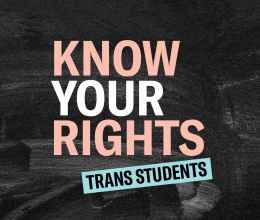
Every student has the right to learn in an environment where they feel valued and can think for themselves. This fundamental promise of our democracy is under attack in Indiana.
Education that reflects and affirms all students prepares them to thrive in our diverse state. Yet, Indiana schools have become increasingly unwelcoming, even hostile, to LGBTQ+, Black, Brown, Indigenous, and religious minority students. Certain politicians have launched a coordinated campaign to target and exclude these students through politically motivated book bans, classroom censorship, anti-trans policies, and other forms of discrimination.
That’s why the ACLU of Indiana is committed to equipping young adults with critical information to help protect themselves and their rights in academic settings. So sharpen your pencils and get ready to take some notes! Knowing your rights is essential to protecting them.
Note: These resources reference federal law, unless otherwise noted as Indiana specific.
JUMP TO:
Students' Free Speech Rights
The First Amendment guarantees the right of free speech and expression to all, including young people. If you’re a public school student, you don’t check your constitutional rights at the schoolhouse doors. But whether schools can punish you for speaking out depends on when, where, and how you decide to express yourself.
Learn more about your free speech rights at school
Listen to a podcast episode free speech in the classroom
Classroom Censorship and Book Bans
In classrooms and educational spaces across our country, a coordinated attack on our students’ right to learn is underway. Since 2021, dozens of states have moved to introduce and pass classroom censorship bills that restrict students and teachers from discussing race, gender, and sexual orientation in public schools. At the same time, politicians and school boards are making moves to ban books—predominately those by Black and LGBTQ authors—from public schools and libraries.
Learn more about the nationwide classroom censorship push
Rights of LGBTQ Students
The ACLU of Indiana, in recent years, has secured several legal victories for LGBTQ students in Indiana, including the right of trans students to use the correct restroom, and students’ right to form LGBTQ-themed extracurricular clubs.
LGBTQ students have a right to be who they are and express themselves in public schools. Public schools have a responsibility to create a safe learning environment, and they cannot ignore harassment based on a student’s appearance or behavior.
Please note: A new Indiana law, HEA 1608, requires teachers and school staff to notify a student’s parent if they request to be referred to by a different name or pronoun. The law does not require schools to get a parent's approval. Learn more about pronoun requests here.
HEA 1608 also vaguely bans conversation on “human sexuality” in grades k-3, leaving teachers uncertain about what they can and cannot discuss in schools. We are currently fighting this part of HEA 1608 in the courts, and if a teacher is disciplined as a result of this law, they should reach out to the ACLU of Indiana here.
Dress Codes
While schools are allowed to establish dress codes, students have a right to express themselves. Schools cannot enforce dress codes in ways that discriminate against people for who they are. They cannot use dress codes to punish girls, people of color, transgender and gender non-conforming students.
How to fight you school’s sexist dress code podcast
Religious Freedom Rights
Religious liberty in public schools protects students’ voluntary ability to pray and express religious viewpoints, provided that they do not cause a disruption or interfere with the education of other students. Religious liberty also means public school officials may not incorporate prayer or other religious activities into class or school events.
Sex-Based Discrimination on Campus
Title IX requires equitable treatment in athletics, protects pregnant and parenting students and transgender students against discriminatory treatment, and requires schools to respond appropriately to allegations of gender-based violence and harassment on campus.
Race, Ethnicity, or National Origin-Based Discrimination
Under Title VI of the Civil Rights Act, discrimination based on race, color, or national origin in programs or activities receiving federal financial assistance is prohibited. This includes schools and colleges that receive funding from the U.S. Department of Education.
Tribal Regalia
Graduation from high school is a pivotal, once-in-a-lifetime achievement. Many Indigenous students cannot fully celebrate this achievement, from both a spiritual and cultural perspective, unless they are permitted to wear their ceremonial tribal regalia (for example, an eagle feather or beadwork on their graduation cap) during the event.
The Rights of Immigrant Students
Schools cannot discriminate against students on the basis of race, color, or national origin. Undocumented children cannot be denied their right to a free public education, and schools should not require families to prove their immigration status in order to enroll their children in school. Students with limited English proficiency cannot be turned away by public schools, which must provide them with language instruction.
The Rights of Students with Disabilities
Public schools are prohibited by federal law from discriminating against people with disabilities, and cannot deny them equal access to academic courses, field trips, extracurricular activities, school technology, and health services. Educators and administrators must also make necessary academic and medical accommodations, ensure equal access to educational activities and opportunities, and respond to harassment and bullying.
Pregnancy Discrimination
Public schools and all schools that get federal funds are prohibited from excluding pregnant or parenting students from school, classes, or extracurricular activities, or pressuring them to drop out or change schools.
These schools must provide pregnant students the same accommodations that students with other temporary medical conditions are given, including the ability to make up missed classwork, attend doctor’s appointments, take time off for childbirth and recovery, and learn in a safe, nonjudgmental environment.
These schools are not allowed to punish a student who chooses to terminate a pregnancy or reveal a student’s private medical information.
Stopped by Police at School
If you’re stopped by a police officer at your school, stay calm. Ask if you’re free to leave. If the answer is yes, calmly and silently walk away from the officer. If the officer asks you a question, you have the right to remain silent. You also have the right to refuse to write or sign a statement.
You can refuse to give your consent to be searched by the police. This may not stop the search, but this is the best way to protect your rights if you end up in court.
Don’t consent to a phone search; police need a warrant to search your phone. The same goes for a strip-search. No police officer or school employee has the authority to strip-search you.
Don’t resist, fight, or flee from an officer who is arresting you. Say you wish to remain silent and ask for a lawyer immediately. Don’t say anything, sign anything, or make any decisions without a lawyer present.


